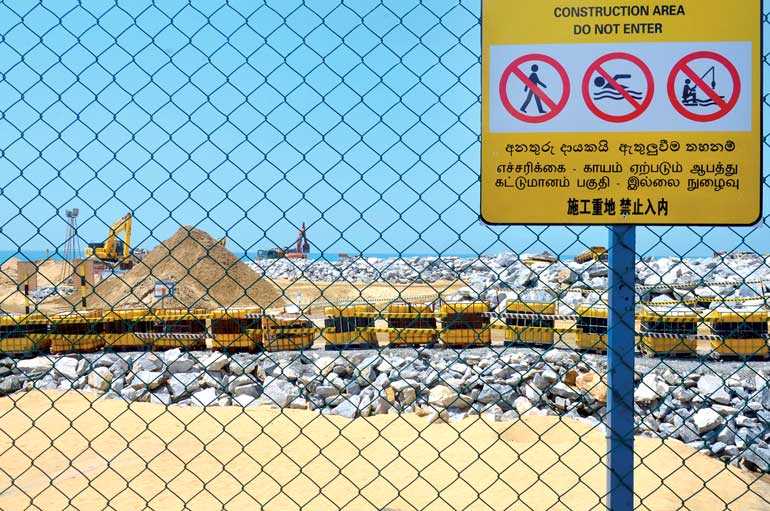Sunday Feb 22, 2026
Sunday Feb 22, 2026
Thursday, 17 May 2018 00:00 - - {{hitsCtrl.values.hits}}

The focus on the physical environment, infrastructure, and the spectacle can be traced back to 1977. From Mahaweli to Megapolis, Sri Lankan governments have equated national development with infrastructure building and monumentalism
– Pic by Shehan Gunasekara
If people spend hours in roughly-driven buses filled with blaring music and getting off is a traumatic experience; if girls and women have to constantly defend themselves from boys and men in public transport and public spaces and their comfort zones are highly limited; if people are stressed out and constantly struggling to cut in front of others and are not reluctant to look down upon others due to ethnicity, caste, class, sex, or political allegiance; if education requires tuition and spending the whole day in classes; if getting the doctors’ attention requires channelling in a private clinic; and if national leaders get enormously rich after they assume public office; what is the level of development? Would denying responsibility for urban flooding and garbage mountain collapses, cleansing neighbourhoods of the poor and the powerless, and building a Megapolis and Port City develop such a society?
The last regime (2010-2015) spent huge undisclosed amounts of money on road construction. Yet road-building projects have been of little help to ordinary people.
Despite the heavy investment on building highways to concreting niyaras, Sri Lanka is the only country that I know of where bus drivers hardly think that they have to stop the bus for passengers to get on and off. The buses are very slow, mostly uncomfortable, and not women-friendly; child- and disabled-friendliness are not even considered. 
According to a 2016 newspaper report, duelling buses cause one death per day. This exposes a colossal gap between the cost and benefits of so-called development and between people’s aspirations and “development” practices. The experts hardly learn from people but assume that they know what people should want.
The focus on the physical environment, infrastructure, and the spectacle can be traced back to 1977. From Mahaweli to Megapolis, Sri Lankan governments have equated national development with infrastructure building and monumentalism. As the focus shifted to high-visibility projects, more political capital for the ruling party, and higher individual paybacks, the money spent on development projects has skyrocketed.
Simultaneously, development has side-lined the goal of improving the quality of life and the life journeys of ordinary people; these are not even acknowledged anymore but manipulated when needed. The national leaders have clearly failed to take people to the promise land, whether Singapore or elsewhere.
People themselves have lost track of their own worth; not many people even notice that the bus does not stop for them; going behind politicians, paying bribes for ordinary things, and even stealing are no longer below their dignity. This calls for further investigation of the state of the nation and its development.
Conspicuously absent from contemporary development thinking is ordinary people. The gap between the results and expectations of development is compounded by the gap between the objectives of the state’s projects and the people’s needs and wants.
It is time to dig deeper and seriously ask some basic questions about development: Is it measured by the input or the outcomes? Are the billions of dollars spent, the increases in the GNP, the grandeur of highways, or the beauty of cities that matter? Should development not uplift the wellbeing of people? Should wellbeing include how quickly, freely, and safely people, including women, children, the elderly, and the disabled can accomplish their needs and desired activities?
Evidently, the disconnect between development goals and strategies is caused by the influential experts’ inability to read the strengths, weaknesses, openings, roadblocks, and conjunctures due to the lack of knowledge of development. This lack is compounded by the State’s manipulation of knowledge to serve capital and the private gains of powerful politicians. “Development” increasingly serves the interests of a few.
Scholars and experts largely view development from global perspectives, from a Western vantage point that are considered superior to “local” perspectives. I examine development at a national scale, but from within Sri Lanka, employing an inside-out perspective, using the threshold between the national and international to look at the nation and outwards from it.
I also do not view the nation as a victim of larger external (global/imperial) impositions. National leaders do have agency and they employ it in negotiations; they participate in shaping the nation’s development trajectory. Hence, it is not unfair to expect the leaders to use their agency to negotiate the “development status” of the nation, with a substantial understanding of the context, and take responsibility for the outcomes. This approach enables the author to identify potential room for national development, State intervention, and the level of effort made by the politicians and experts in this regard.
Squandered opportunities
My studies reveal that there were three major “development opportunities,” i.e., to better position Sri Lanka within the capitalist world economy. The governments squandered them all.
The first was at independence: Instead of building on the strengths of Ceylon and continuing with the emergent “Sri Lankan model” of development, the first National Government elected to follow the West’s historical trajectory, accepting a development deficit. According to development anthropologist Arturo Escobar, the deficit occurs when a nation accepts that it lacks something internally called development and believes the nationals ought to work hard and make sacrifices to overcome the lack.
The second opportunity was in the late-1970s-’80s when the capitalist world-economy was in crisis. As Ronald Reagan, Margaret Thatcher, and Deng Xiaoping reproduced the world economy by constructing what came to be known as neoliberalism, the 1977 Government took part in it by accepting structural adjustments, renewing Sri Lanka’s Third World status.
The third moment is now: The world economy is in transition and China and India are attempting to establish their dominance and order. Instead of negotiating a better position within the emerging world-order, the last Government constructed an economic and political dependency on China. The opportunity is still available, but the current Government too seems stuck in the dependency; if it continues, the underdevelopment status might last for another century.
I examine these themes in relation to the above conjunctures: My studies demonstrate that the national leaders and experts have failed to understand the very development discourse in which the national economy takes part, the development potential within the nation, the openings that arise from time to time within the world economy, and the opportunities the combination of these provide.
The following parts demonstrate that the lack of development in Sri Lanka is largely caused by the lack and inaptness of the knowledge employed to change the developmental predicament (or the deficit) of the nation. The main causes for missing the opportunities are the lack of grounded expertise and the mentality and scarcity of the leaders and influential experts.
[Professor Nihal Perera is Chair of the Department of Urban Development at Ball State University, IN, USA and the Founding Director of CapAsia, one of the best immersive learning programs in the USA. The two-time Fulbright Scholar (China, Myanmar) was also Senior Research Fellow at the National University of Singapore and Melting Pot Fellow at KMITL, Thailand. He was the Chief Architect-Planner of the Mahaweli Project (1983-89); his team built 12 new towns employing a locally-developed planning method. He is also the author of ‘Decolonizing Ceylon,’ which introduced the study of social space and politics of space to Sri Lanka followed by two other books based on his research in Asia: ‘Transforming Asian Cities’ (Routledge, 2013) and ‘People’s Spaces’ (Routledge, 2015), and a special issue of Bhumi on development (2016).]
[Note: An earlier version of this paper was delivered as keynote to the 14th Centre for Poverty Analysis (CEPA) Symposium onInfrastructure and Development, Colombo, Sri Lanka, 23-4 November 2015. CEPA then helped to transform the articles I published in Bhumi journal into four newspaper articles. I am thankful to Nirmani Liyanage and Sharni Jayawardena for editing and sizing this series. I dedicate these papers to late Vijay Nagraj who fought relentlessly for the people and Mansi Kumarasiri for her great help.]